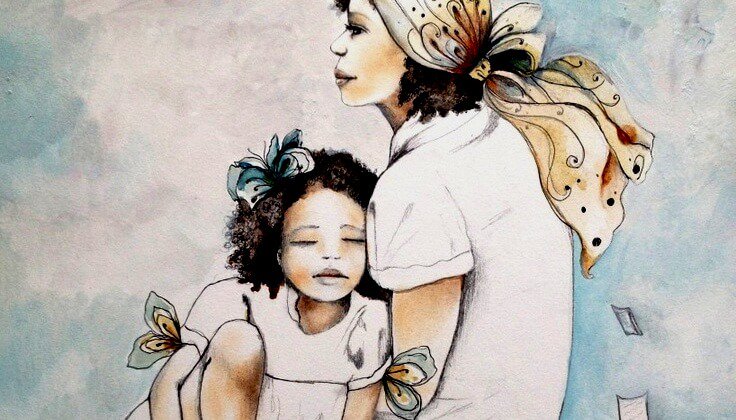Children Need Emotional Intelligence

If we want to educate our children to be strong, we must have it clear that emotional intelligence is the key. Children need emotional intelligence to help them become aware of their emotions and to control and regulate their reality, opening up the way for a multitude of positive experiences.
But, as we know, not everything in life is beautiful and marvelous. The old Disney ideals of princes and princesses with few goals in life beyond surrendering blindly to dependent relationships in magical worlds filled with witches and evil dragons are far from reality.
Not everything is as they told us, nor is the world made up of black and whites, or of “good and bad”, which essentially suggests that in absence of the “bad”, everything is fantastic and full of happiness. Without a doubt, this is not how things are, and so these concepts offer an unrealistic image of the world that we have to deal with day by day.
It is our responsibility to say goodbye to “they lived happily ever after” and to switch over to “life is built on the basis of one’s own strength”.
We can’t continue painting the world rose-colored, because our children will grow up and they will face problems that they won’t know how to resolve due to the huge discomfort and the incomprehension and injustice that it will generate for them.
So, helping them and encouraging them to have awareness of their emotional states and those of others sets the mark between the before and after on their journey towards strength.

Children need emotional intelligence; it is key to their development
The development of emotional awareness in infancy sets down the foundations that will help to generate good strategies for regulating emotions later in life. So, a low level of emotional awareness leads to less flexible regulatory strategies and hence a more limited ability to solve problems.
The ability of emotional awareness evolves throughout childhood development, facing varied and complex emotional experiences from a complete spectrum of feelings
In this sense, the development of this key ability includes aspects related to attention and attitude that we cannot neglect. Let’s have a look at this in detail:
- Attention is important for identifying and differentiating emotions as well as identifying what causes them and even managing the bodily sensations that form part of the emotional experiences (for example, tension in the abdominal area).
- Attitude is necessary to detect the emotional experiences and expressions triggered in oneself and others.

So, depending on the stage of evolution, we will find that emotional awareness has a decisive role in different essential tasks (forming affective bonds, development of social cognition, forming an identity, etc.).
- From 0 to 2 years: babies are capable of paying attention and reacting to the emotions of others. If the carer smiles, the baby looks at them more often. If the carer is sad, the baby looks less often and tends to facially express sadness. This kind of contact favors the formation of affective bonds.
- From 2 to 5 years, children need to learn to differentiate and verbally communicate basic emotions like happiness, sadness, anger and fear. They still fail to identify surprise. This favors the development of the ability to consider and understand others.
- From 6 to 12 years they should learn to analyze their own emotions and to be more aware of the bodily sensations that accompany them, which contributes to forming an identity.
Emotional regulation can sometimes be a difficult path to walk
It is not enough for children to just understand and be aware of their emotions. We must also encourage them to regulate and control their reactions both individually and in relation to others.
Emotional regulation is often the pending task in many families. This is because managing our emotions is not an easy aspect to develop.
The main mistake made is teaching children that unpleasant emotions (sadness or anger) should be ignored (“don’t listen to them”) or changed (“don’t get angry over that silly thing”); or even, sometimes shame is encouraged around these emotions (“don’t be a cry-baby”).

Bearing this in mind, it is understood that emotional regulation consists of handling emotions correctly once you are aware of them. There are two main ways of promoting the development of this ability:
- Based on controlling our emotional expression: the child is very angry but tries not to express it to instead solve the conflict differently because, let’s say, he adapts himself to certain rules of expression that promote the greater good.
- Based on the cause: here we can encourage the child, who is aware of his emotions, to control his behavior so as to handle the inherent cause of the emotion.
Developing emotional awareness helps the child to know the reason that he is feeling what he feels and so he will notice that the situation is important and requires attention. This helps them to build themselves flexibly and robustly, experiencing all aspects of their life from the most genuine reality: that which they experience as they relate to the world.
Emotional awareness is the best vehicle for change in our lives. That is to say that we need to be aware of what causes us frustrated, negative, positive or pleasant feelings so that we can find ways to encourage them, understand them and control them.
If we deprive our children of the correct emotional development, the consequence will be the inability to understand and evolve according to their emotions and feelings. So, teaching children to observe, communicate and learn about their emotions is essential to promote their development and success in life. Due to all this, our main responsibility at this stage is to promote the development of their emotional intelligence, the key to strength.
This text is provided for informational purposes only and does not replace consultation with a professional. If in doubt, consult your specialist.








